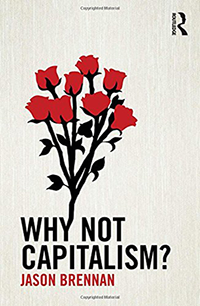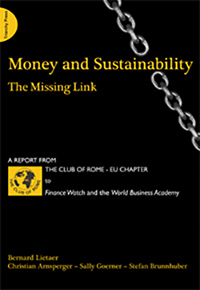The problem with money as a measure of equitable value
I think an increasing number of people share my concern that the traditional capitalist model, which continues to underpin Western democracies and to forcefully confront other models of community governance, is severely broken. Protectors of the capitalist realm argue that capitalism is superior to other known alternatives, such as socialism. But many will admit that it feeds – and feeds upon – negative human values such as greed, envy, fear, selfishness and intolerance. They will probably point out that these negative values are also a feature of socialist models such as Russian communism, which they will likely argue caused much more societal harm than the intermittent failures of capitalism, including the recent financial markets strife in America.
The Conscious Capitalism movement would probably argue that deficiencies in the capitalist model relate to its application rather than its design, and that its potential for ‘good’ is evidenced by the (often claimed) fact that it is responsible for lifting millions of people out of poverty. Conscious capitalists see a positive future for a less selfish model of capitalism, one that embraces a multi-stakeholder view of an organisation (or community) and acknowledges the need to create shared value outcomes for all stakeholders. They will probably agree that this new capitalism is still an emerging and imperfect model and that there is limited evidence to support its longer-term viability. However, the rise of conscious capitalism represents an important public admission from the capitalist lobby that there are fundamental human issues associated with capitalism’s current application. And their current focus on finding a more equitable way of sharing the ‘benefits’ of capitalism shows that they clearly understand – and therefore acknowledge – its propensity to accentuate economic inequality and to widen the gap between rich and poor.
In his book Why Not Capitalism? Jason Brennan argues that capitalism has the potential to be a more successful model than socialism. While I do not find his demolition of Jerry Cohen’s argument for Why Not Socialism? all that interesting, Brennan’s definition of what could constitute a more acceptable model of capitalism summarises the inherent challenges facing any revision of the current model. Brennan proposes five principles that could underpin and inform a (new) ideal model of capitalism:
- Voluntary community: ‘that people should live and cooperate with one another without resorting to violence or the threat of violence . . . [that] they should be allowed to be themselves . . . and should not be coerced to be someone else’
- Mutual respect: ‘ that people are tolerant of one another’; that they welcome difference and diversity and ‘have the freedom to pursue their own vision of the good life’
- Reciprocity: ‘ that people do not confront each other as creatures of need; that they trade value for value with each other in all of their relationships . . . and get satisfaction from being able to serve others’
- Social justice: that people adhere to ‘a set of rules to ensure that no one through any fault of his or her own will lead a less than decent life . . . [that] everyone has sufficient opportunity, wealth and freedom to have a good chance to live out his or her conception of the good [life]’
- Beneficence: that people ‘care about one another, and where necessary and possible they care for one another, and too, care about that they care about one another’.
I imagine few readers will disagree with these principles, with your position perhaps depending on how you define ‘wealth’ and ‘value’’ and what constitutes ‘the good (or decent) life’. It will not have escaped you that these principles could also underpin a socialist model!
Brennan admits that while his ideal model may be desirable, it might not be currently feasible due to:
- ‘The limits of human nature . . . people are insufficiently cooperative, generous, tolerant and respectful, and
- ‘The limits of social technologies . . . that even if people were, or could become sufficiently cooperative, generous, tolerant and respectful . . . we do not know how to harness these virtues . . . to turn the wheels of the economy.’
It is this lack of social technology – our current inability to ‘design suitable organisational technology’ – that Brennan sees as the major obstacle to implementing his ideal capitalism.
But I think there is a more fundamental problem here which relates to the notion of designing social technology to turn the wheels of an economy and what that means for the ‘value trade in [the] relationships’ that are critical to Brennan’s model. In particular, what constitutes ‘value’, how would that value be negotiated (or traded) and, therefore, how would it be measured?
The common measure of value in a capitalist system is money. But before we assume that money can be used as a measure of value within a sustainable social system we should pause to consider the issues raised by Bernard Lietaer et al in their book Money and Sustainability – The Missing Link. This book argues that there are five reasons why the current monetary system does not enable a sustainable society:
- It creates boom and bust cycles: ‘Banks provide or withhold funding to the same sectors and/or countries at the same time . . . [thus] amplifying both upturns and downturns in the business cycle . . . which is detrimental to everyone including the banks’
- It causes short term thinking: ‘. . . the interest feature of the money system [systematically] programs “rational” investors [through discounted cash flow principles] to discount the future’
- It requires unending growth: ‘. . . the mechanism of compound interest [interest charged on interest] . . . imposes exponential growth on the economy . . . which by definition is unsustainable in a finite world’
- It concentrates wealth: ‘. . . wealth flowing to the top and increasing rates of poverty at the bottom . . . generate a broad range of social problems and are also detrimental to economic growth’
- It destroys social capital: ‘Recent scientific studies show that money tends to promote selfish and non-collaborative behaviours… [that] are not compatible with long-term sustainability’
It is clear from Lietaer’s analysis that for Brennan’s new (ideal) capitalism to have any chance of future success we will need a different monetary system or, more likely, an ecosystem of complementary monetary systems (in which monetary has a different meaning from currency) to enable it. Although Lietaer outlines nine examples of alternative monetary systems, and refers to another 12, he cautions us that ‘we have still much to learn, particularly about which governance systems are most appropriate for each system’.
I argue that conscious capitalism is at worst an attempt to justify the continuance of a very problematic economic model and at best a positive evolution of that model – hopefully representing an important step in a long journey towards a new model. But I must agree with Brennan that any new model is fundamentally dependent on new social technology and, based on Lietaer’s analysis, new thinking about the value exchange mechanism that can sustain that technology. And that value exchange must be able to embrace the many different concepts of value inherent in any social system (or technology) which is dependent on sustaining the diverse relationships of a community of stakeholders.
And this brings us to the nub of the issue for me. I find the suggestion that we need to discover a new social technology in order to enable a new economic model somewhat perverse. Surely we need to find a new social model and discover a new value exchange mechanism that will enable and sustain that model to create a more equitable society. That is the thinking behind The Congruence Framework, which envisages harmonious communities founded on a common purpose and bound together by meaningful relationships that are secured by the co-creation of shared equitable value outcomes.
The concept of shared equitable value, which is fundamental to the development of the relationships that enable congruent communities, is akin to the ‘value trade’ which is necessary to enable Brennan’s ‘voluntary community’. And a mechanism that can enable people to create and exchange this value will surely require a new ‘monetary ecosystem’ that can address Lietear’s issues with the current monetary system.
But it is important to remember that this new ‘monetary ecosystem’ would not be an end in itself. It would be an essential enabler of a larger social ecosystem which, as Brennan envisages, could support a society where people ‘cooperate with a common desire that everyone has the freedom and resources to flourish under their own conceptions of the good life . . . where everyone operates on the principles of mutual concern, tolerance and respect’. Or, as I would say:
-
a community where people with a shared purpose act together through meaningful relationships to co-create outcomes that represent shared equitable shared value for all. In other words, a congruent community.
To consider the potential for congruence principles to frame the development of a new social ecosystem (and perhaps a new social technology) please refer to my book The Congruence Framework
Books referenced in this post include:





Leave A Comment